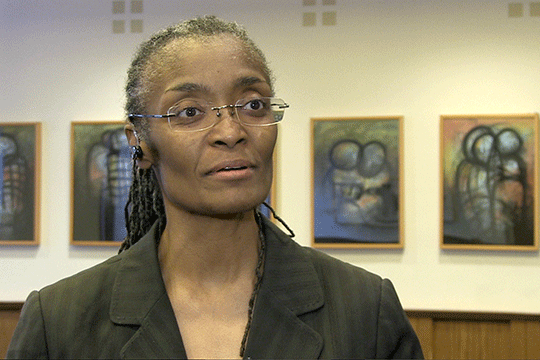Informed Advocacy: Lorraine Hexstall (Ed.M., Human Development, Cognitive Studies in Education)

Life before TC
Lorraine Hexstall’s son was 13 when he was found to have a visual discrepancy that was harming his performance in school. Until then, says Hexstall, who is African-American and was born and raised in Harlem, teachers and school staff attributed his struggles to his gender, his race, or both. Hexstall decided she needed to understand better how teachers thought – and how parents could constructively advocate for their children. She’d always worked full-time, including while earning her undergraduate degree from Hunter College, so the prospect of continuing to do so as a doctoral student didn’t scare her. She enrolled at TC in 2007and doggedly forged ahead.
Why TC
“I came to TC so I could become not just an informed parent advocate, but an impartial one,” Hexstall says. Her adviser, Deanna Kuhn, Professor of Psychology and Education, was piloting a middle school curriculum on “Inquiry and Argumentation” at nearby Columbia Secondary School (CSS). As research assistant to Kuhn, Hexstall participated closely in the work. “There’s a lot of push to get students involved in debate,” she says. “My question was: Can argument’s movement from the periphery to the core help move the ESEA narrative from promise to progress?” . For her thesis, she compared several argumentation programs and explored whether developing the ability to “think well” can improve education outcomes for Title I students, given sanctions of the federal No Child Left Behind legislation.
TC Takeaway
Hexstall found that while cultivating debate and argument can indeed have positive effects, “it doesn’t happen in 45 minutes. It takes a long time to develop better habits of thinking.” But the effort is worth it. “I don’t believe in the word ‘smart’ anymore. Instead, it’s about exposure, practice. And students learn to take chances to acquire new strategies, and the chances are safest in an environment where they are respected as collaborators in constructing knowledge.” At TC, Hexstall also progressed towards her goal of understanding a teacher’s perspective. “I learned the challenges that teachers face and I was able to give them a little grace,” she says. And as a parent -- particularly a minority parent – “I hope I left them a lot to think about.”
What’s Next
Two years ago, Hexstall and her husband moved from Jamaica, Queens to the Hudson Valley. While she continues to commute to her Manhattan job, she plans to start a parent advocacy program in her new hometown, either as a non-profit or through the school system. Teachers and special education administrators have been very receptive. “They’re all very interested in parent advocacy,” she says. “They want to communicate and find better ways to work with parents, especially of younger children.”
Published Friday, May 1, 2015